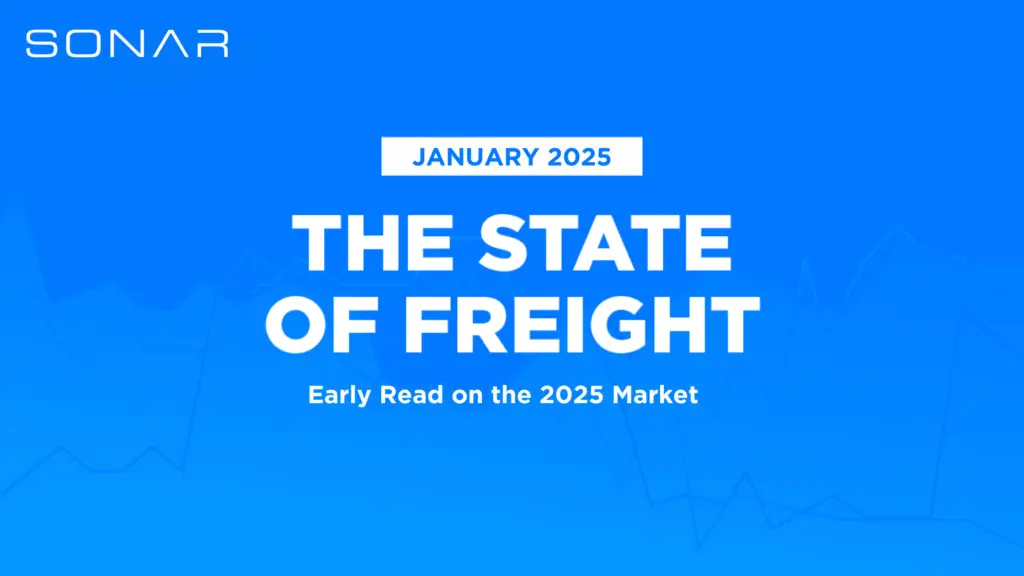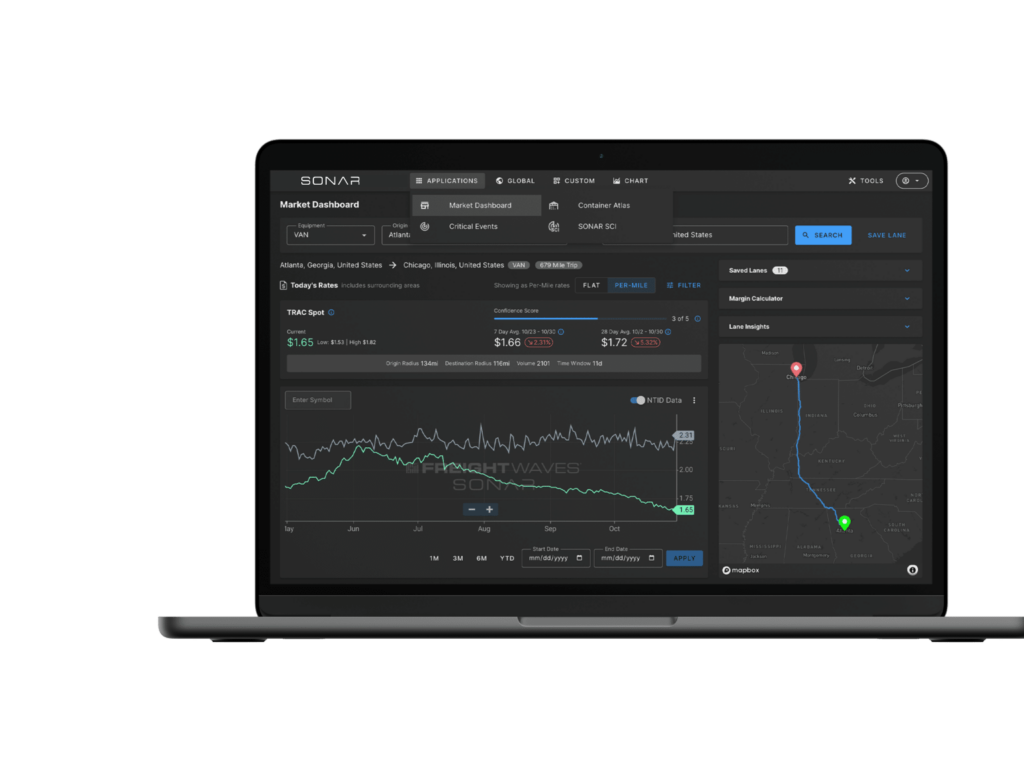Trucking is an incredibly volatile market. SONAR’s role in providing market intelligence is critical for participants to know what the market price for trucking rates are at any moment in time.
The volatility of trucking rates presents a significant challenge to the transportation and logistics industry. Fluctuations in supply & demand, fuel costs, economic cycles, driver availability, market congestion, and regulatory changes can lead to rapid shifts in pricing, complicating efforts for businesses to plan and budget effectively. In such a dynamic environment, the need for accurate, reliable, and timely pricing information becomes paramount.
SONAR steps up to address this challenge by working to establish itself as a Price Reporting Agency (PRA) that participants can trust, specifically within the freight and transportation sector. By leveraging high-frequency freight market data, SONAR provides insights into trucking rates and market dynamics that help carriers, brokers, and shippers anticipate fluctuations and adjust their strategies accordingly.
The emphasis SONAR places on transparency and methodological rigor echoes the core principles of traditional PRAs, such as those that operate in commodity markets.
What does a PRA do and why is it important?
A PRA is an independent organization that collects, assesses, and publishes pricing data for various commodities and markets. PRAs play a crucial role in providing transparency and benchmark prices for industries where pricing information may not be readily available or easily accessible.
PRAs gather pricing information through various methods, including surveys of market participants, analysis of transactions, and expert assessments. They then process this data to produce standardized price assessments that serve as reference points for buyers, sellers, and other stakeholders in the market.
The primary function of PRAs is to bring clarity to opaque markets where prices can be volatile and influenced by numerous factors. By providing reliable and impartial pricing information, PRAs enable market participants to make informed decisions, negotiate contracts, and manage risk effectively.
As a freight market intelligence platform, SONAR, refers to itself as a PRA because it fulfills a similar role in the transportation and logistics industry. SONAR provides high-frequency data and visibility into the freight marketplace, offering pricing, demand, and capacity data across various transportation modes.
By calling itself a PRA, SONAR is positioning itself as a trusted source of pricing information for the freight industry. Like traditional PRAs in commodity markets, SONAR aims to bring transparency and reliability to freight pricing, which can be complex and subject to rapid fluctuations.
SONAR’s platform allows users to benchmark, analyze, monitor, and forecast freight rates and market conditions. This aligns with the core functions of a PRA, as it provides crucial pricing data that helps industry participants navigate the market, make strategic decisions, and optimize their operations.
In the context of the freight industry, where pricing can be influenced by factors such as fuel costs, capacity constraints, and seasonal demand, SONAR’s role as a PRA is to offer timely and accurate pricing information. This data enables shippers, carriers, and logistics providers to better understand market trends, negotiate rates, and plan their transportation strategies effectively.
By providing this critical market intelligence, SONAR aims to fulfill the traditional role of a PRA in bringing transparency and efficiency to the freight market, much like how other PRAs operate in commodities markets such as energy, metals, or agriculture.
There is a global standard for PRAs that ensure price integrity
The International Organization of Securities Commissions (IOSCO) establishes globally recognized standards that guide financial entities, including Price Reporting Agencies (PRAs), in their operations. These principles are fundamental in ensuring that PRAs deliver pricing information with the utmost accuracy, integrity, and transparency.
IOSCO’s guidelines emphasize several crucial components for PRAs, including the necessity of clear and publicly accessible methodologies. This transparency allows market participants to comprehend the foundation upon which pricing data is assessed and reported, ensuring consistency and reliability in the data provided.
A key focus of the IOSCO principles is the accountability and independence of PRAs. PRAs are required to maintain impartiality by avoiding conflicts of interest that could compromise data integrity. This is achieved through strict internal controls that certify price assessments are genuine reflections of market conditions rather than influenced by biased external factors.
Furthermore, IOSCO guidelines stress the importance of rigorous data integrity practices. PRAs are expected to gather pricing information from dependable sources and apply comprehensive analytical methodologies to validate this data’s accuracy. Such meticulous processes bolster the credibility and trust in PRAs among industry stakeholders, ensuring that pricing assessments are both reliable and reflective of actual market activities.
For market participants, including traders and investors, adherence to IOSCO standards by PRAs is crucial. It ensures that they have access to precise and objective pricing information essential for informed decision-making and effective risk management in volatile market environments. In this regard, SONAR aspires to embody these IOSCO principles to provide transparent and trustworthy market intelligence within the freight industry. Through this commitment, SONAR seeks to enhance reliability in freight rates and market conditions, paralleling the traditional role of PRAs in other commodities markets.
By committing to IOSCO-aligned standards, SONAR ensures that its price assessments are conducted with objectivity, accuracy, and transparency, fostering a sense of trust among its users.
One of the key initiatives SONAR pursues is the integration of real-time data analytics to enhance market visibility. By continuously updating and disseminating pricing information, SONAR equips industry stakeholders with the intelligence needed to make proactive, data-driven decisions. This approach reduces the uncertainty that often accompanies rate volatility, empowering participants to better negotiate contracts and manage logistical challenges.
Moreover, SONAR’s development of predictive analytics and forecasting tools further enhances its value proposition as a PRA. By anticipating future market trends and pricing scenarios, SONAR enables businesses to strategically prepare for shifts in the freight landscape, ensuring they remain competitive despite potential disruptions.
In creating a PRA that industry participants can rely on, SONAR not only provides critical market transparency but also reinforces the stability and efficiency of the freight market itself. This dedication to improving rate clarity in such a volatile sector reflects SONAR’s commitment to fostering an environment where transportation businesses can thrive amidst complexities and uncertainties.
SONAR is the first and only trucking PRA that publishes prices under IOSCO principals.
In commodity markets, the confidence provided by adherence to IOSCO standards is paramount for supporting the financial decisions of traders, investors, and other stakeholders, ultimately fostering a fair and efficient marketplace. SONAR aspires to create the same level of transparency among carriers, brokers, and shippers.
What other businesses are known as PRAs?
PRAs are common in commodity markets such as oil, energy, metals, and agriculture commodities. Companies like OPIS, S&P Platts, Fastmarkets, and Argus are major players in the PRA industry.
Other well-known Price Reporting Agencies (PRAs) exert significant influence across various industries by providing essential market clarity and transparency. For instance, Fastmarkets is renowned for its expertise in the metals and mining sector. It offers a comprehensive suite of pricing data and analytical tools, serving as a critical resource for those navigating the complexities of commodities like aluminum and copper. Fastmarkets’ assessments are integral in contract negotiations and help market participants understand underlying supply and demand dynamics.
Similarly, S&P Global Platts dominates the energy and petrochemical markets, delivering pricing benchmarks that are pivotal for global oil, gas, and petrochemical transactions. Its rigorous price discovery process adheres to core IOSCO principles, ensuring its data reflects true market sentiment. This enables companies to hedge risks and make strategic decisions based on reliable, transparent information.
Argus, another key player, provides detailed pricing and trend analysis across energy, minerals, and chemicals. By offering a robust price discovery mechanism that does not rely on vested interests, Argus ensures impartiality and accuracy in its reports. This impartial data is crucial for refining, distribution, and trading sectors to remain competitive in volatile markets.
These agencies collectively help standardize market pricing, enhance transparency, and reduce information asymmetry, which in turn promotes fair competition. Their methodologies, although occasionally scrutinized, are continually refined to maintain data integrity and reliability. Through meticulous data collection and expert analysis, PRAs like Fastmarkets, S&P Platts, and Argus fulfill indispensable roles akin to SONAR’s function in the freight market, each sustaining their respective industries with much-needed pricing clarity and market insights.
To learn more about how SONAR can provide rate insights, request a demo.








